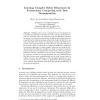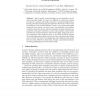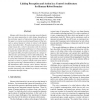443 search results - page 22 / 89 » Lazy learning for control design |
CDC
2009
IEEE
14 years 11 days ago
2009
IEEE
— Since Witsenhausen put forward his remarkable counterexample in 1968, there have been many attempts to develop efficient methods for solving this non-convex functional optimiz...
EWLR
1997
Springer
13 years 11 months ago
1997
Springer
Building robots can be a tough job because the designer has to predict the interactions between the robot and the environment as well as to deal with them. One solution to cope the...
ECIS
2000
13 years 9 months ago
2000
We draw from the quality management and organizational learning literatures to develop a descriptive model of software process management. These literature streams suggest that the...
ECML
2006
Springer
13 years 11 months ago
2006
Springer
Abstract. Many complex control problems are not amenable to traditional controller design. Not only is it difficult to model real systems, but often it is unclear what kind of beha...
HICSS
2003
IEEE
14 years 29 days ago
2003
IEEE
Human-robot interaction is a growing research domain; there are many approaches to robot design, depending on the particular aspects of interaction being focused on. In this paper...



